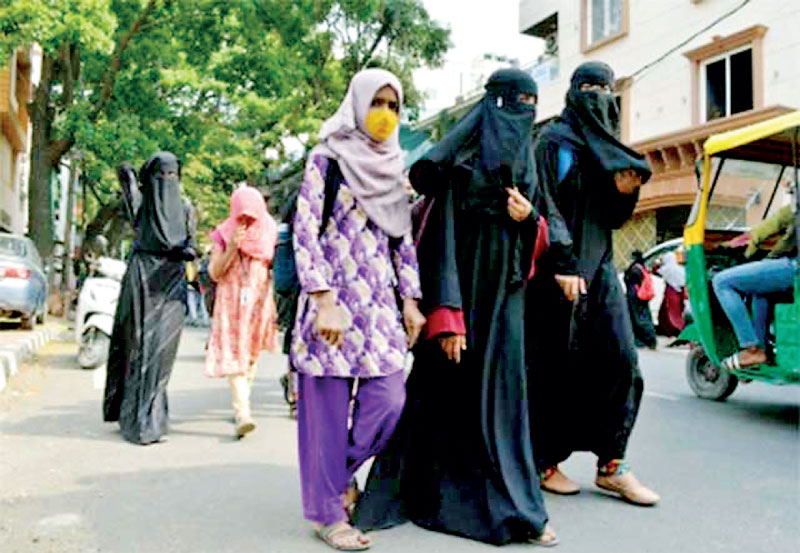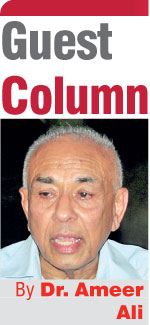Thursday Feb 12, 2026
Thursday Feb 12, 2026
Monday, 11 September 2023 00:11 - - {{hitsCtrl.values.hits}}

|
 Whether it was a “politically strategic or principled decision”, RW’s initiative to implement the 13th Amendment (13A) has raised fears in the different communities for different reasons. Among them the Muslim community, almost one third of which live in the north and east of the country, is raising concerns over their future in a Tamil dominated single mega province or two separate provinces with powers devolved as per the provisions in 13A. Muslim politicians have been requesting an exclusive dialogue with RW to discuss this matter but their request has so far been ignored. There may be two reasons for RW’s nonchalance. Firstly, 13A was an India inspired legislation, and Rajiv Gandhi’s main concern at that time was to satisfy the Tamil community and prevent its youth from weaponising the Tamil problem, which of course failed. That exclusive concern for Tamils is even stronger under Modi’s regime, which has no sympathy for the Muslims. RW may not therefore wish to displease his Indian strategic friend by giving prominence to Muslim concerns. Secondly, a more plausible reason could be RW’s confidence that he could win the support of Muslim leaders for any decision he takes in the end. History has proved repeatedly that Muslim politicians with rare exceptions have no principles but only interests. If the price is right, they would raise their hands to support any motion even if it were to prove detrimental to their own community as demonstrated during the 20th Amendment saga. With such leadership that the Muslim voters themselves chose, it would be difficult for the community to counter the Tamil demand for the full implementation of 13A.
Whether it was a “politically strategic or principled decision”, RW’s initiative to implement the 13th Amendment (13A) has raised fears in the different communities for different reasons. Among them the Muslim community, almost one third of which live in the north and east of the country, is raising concerns over their future in a Tamil dominated single mega province or two separate provinces with powers devolved as per the provisions in 13A. Muslim politicians have been requesting an exclusive dialogue with RW to discuss this matter but their request has so far been ignored. There may be two reasons for RW’s nonchalance. Firstly, 13A was an India inspired legislation, and Rajiv Gandhi’s main concern at that time was to satisfy the Tamil community and prevent its youth from weaponising the Tamil problem, which of course failed. That exclusive concern for Tamils is even stronger under Modi’s regime, which has no sympathy for the Muslims. RW may not therefore wish to displease his Indian strategic friend by giving prominence to Muslim concerns. Secondly, a more plausible reason could be RW’s confidence that he could win the support of Muslim leaders for any decision he takes in the end. History has proved repeatedly that Muslim politicians with rare exceptions have no principles but only interests. If the price is right, they would raise their hands to support any motion even if it were to prove detrimental to their own community as demonstrated during the 20th Amendment saga. With such leadership that the Muslim voters themselves chose, it would be difficult for the community to counter the Tamil demand for the full implementation of 13A.
|
However, whether the Muslims support or oppose 13A the community is caught between two evils: an internationally backed and aggressive Tamil nationalism which is only marginally interested in Muslim affairs, and an even more hawkish Bhikkhu led Sinhala resistance group whose demagogues consider Muslims as aliens. Tamil nationalism, which started as the representative voice of all Tamil speaking people including the Muslims, gradually excluded the latter, paving the way for the rise of Muslim political parties. The deterioration of Tamil-Muslim relations in the north and east, despite a strong linguistic affinity, reached its nadir when the Tamil Tigers unleashed violence against them. With Prabakaran’s wholesale expulsion of Muslims from Jaffna and Mannar in October 1990 followed by episodes of LTTE massacres of Muslims in parts of the Eastern Province, which provoked counter expulsions and massacres of Tamils in Muslim enclaves, the two communities that lived cheek by jowl like the proverbial pittu and coconut distanced themselves minimising their contacts with each other. This situation arose due to the abject failure of the leadership on both sides. Brevity prevents tracing the history of that failure. But the tragedy is that even now leaders from both sides are casual and indifferent to rectify the damage, and the Muslims in particular see 13A as a mortal threat to their very survival as a vibrant community. The land issue is at the heart of this fear. For example, in the Batticaloa District Muslims accounting for 30% of the population are locked within a land area of approximately 20 km2 which is less than one% of the total area of that district. With the devolution of power over land and police administration to Tamil dominated provincial councils Muslims fear they would be forced into living in overcrowded areas. Kattankudy with 4.3 km2 and 50,000 people is already transforming into a modernised urban sprawl.
Nevertheless, by opposing 13A the community is inadvertently strengthening the hands of the Sinhala opponents who themselves have no special love for the Muslims. Political opportunism would encourage Sinhala Buddhist supremacists to ally with the Muslims temporarily to promote the supremacist agenda of transforming the demographic topography of the north and the east. The Sinhala Buddhist hegemonic agenda is proceeding without any check, with weaponised archaeology, violent land acquisitions and cynical schemes to chop and change areas of electorate districts through delimitation commissions so as to reduce minority representations in the two provinces. Mullaitivu is one district in the north where this sinister exercise is blatantly carried out. But once these hegemons gain control of these areas their Muslim ally would become curry leaves. To the hegemons, the Tamils are at least natives but to be kept enslaved, whereas Muslims are aliens to be dispatched to the Middle East. This frightening scenario cannot be dismissed if one were to critically study how the prevailing socio-political system or paradigm has worked over the last seven decades. So, what is the way out for the Muslims as well as other minorities?
System change is imperative and is the crying need of the time. The country needs a system based on a new constitution that enshrines the values and principles of secular democracy with an uncompromising independence of the judiciary, if it desires to remain a peaceful, vibrant and economically thriving multi-ethnic and multi-cultural polity like Singapore. The rights and freedom available to and enjoyed by an Appuhamy must be the same to an Anthony, Arumugam or Abdulla. It was from such a platform that the aragalaya youth raised the cry for system change and called for a new paradigm in governance. Regrettably, a lack of coordinated and matured leadership and associated structural weaknesses in their organisation hindered the aragalaya from carrying forward its demand beyond the sloganeering stage.
Currently however, of all the political parties and groups in the fray to capture power only the National People’s Party (NPP) appears to have taken the aragalaya cudgel to change the system. Therefore, Muslims must wake up and realise that they have no future under the existing ethnocentric political culture, and that to counter Sinhala and Tamil nationalisms with Muslim communalism would be suicidal. What have the so-called Muslim parties achieved so far?
From the time of the introduction of parliamentary democracy in the country, Muslim politics had been an exercise in choosing and joining the winning side. The two Muslim parties play the same game. Within the confines of ethnocentric politics Muslim leaders chose political opportunism as the winning strategy to gain prestige and privileges rather than fight for rights. That strategy was tolerated and even welcomed by the Sinhalese leaders, because it helped them to ignore and defeat any threat from Tamil nationalism. After 2009 however, that situation changed dramatically. After winning the civil war and in a triumphant mood, political Buddhism and its champions now claim supremacy and ownership of the entire country. Its leaders are rejecting RW’s 13A initiatives. Do Muslims blindly desire to join these supremacists without considering an alternative like the NPP that wants to change the system and lead the country along a different path? The 13A is bad, but removing it without changing the political paradigm would be worse. RW’s initiative to implement 13A in the name of reconciliation is an exercise in fine tuning the existing system.
|
Even in the past when socialist leaders offered alternatives to communal politics the Muslims rejected them wholesale. The NPP is offering another opportunity now. True, there is always the fear of the unknown. But there is risk in everything. The NPP may not be perfect but it seems the only sensible alternative to counter the challenges that face the nation today. The coordinated attack against the NPP by all other reactionary parties is itself a silent testimony to its progressive credentials.
(The writer is attached to Murdoch Business School, Murdoch University, Western Australia.)